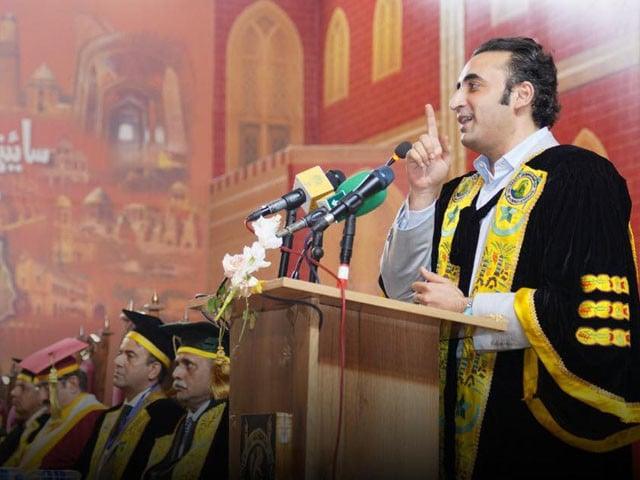Pakistan People’s Party (PPP) Chairman Bilawal Bhutto-Zardari emphasized the urgent need to take measures to combat climate change and prepare for possible floods during his speech at the convocation of the University of Sindh.
Bilawal called climate change the “biggest problem” facing the world and highlighted the serious risks it poses to future generations. He noted that Sindh had already witnessed the catastrophic impact of climate change in 2022, when the region was devastated by flash floods.
The Sindh government report revealed that the 2022 floods claimed more than 678 lives, displaced 6.8 million people and destroyed more than 1.6 million homes. Additionally, 3.5 million acres of crops were ruined and 216,683 animals died.
Bilawal highlighted the need to make immediate preparations to mitigate the impact of such disasters in the future. He also criticized prolonged power outages, outdated power generation methods and dependence on electricity imports, and urged the country to use its natural resources more effectively.
“God has blessed us with the largest coal mine in the world,” he said, referring to Sindh’s Thar coalfield, one of the largest in the world. The field contains 185 billion tonnes of lignite coal, enough to generate power for more than two centuries, which it says could provide cheaper electricity and help address the challenges of climate change.
Furthermore, Bilawal also addressed the issue of Internet censorship, saying that it must be resolved urgently and emphasizing the importance of digital freedom. “Our infrastructure used to be roads, highways and highways,” he said, adding, “In today’s era, I think it’s our bandwidth, our fiber optic cable, our wireless Internet services.”
The PPP has harshly criticized internet slowdowns and restrictions in the country, describing them as a deliberate effort to control and censor citizens, he added.
He further stated that, as in the past, attempts are being made to control and censor the population by restricting access to the Internet, noting that this is an indication of the government’s fear of citizens exercising their rights online.
Bilawal also condemned the ban on student unions, describing it as another example of the state’s attempt to repress the youth. “This is proof that you are strong and they fear you because they don’t want you to exercise your rights over the internet,” he said.
The PPP chairman urged the youth to fight for their rights and raise awareness on digital freedom issues. He called for the creation of a “digital bill of rights”, insisting that it should be written by students and young people, not Islamabad’s most senior politicians.
“It should be written by students and young people to make their rights known, not by old Islamabad politicians who don’t understand the Internet because they don’t use it,” he said.
Bilawal said that in today’s world, “affordable and equitable access” to high-speed Internet must be considered a “fundamental human right.” He also highlighted the need for strict protocols to combat misinformation and ensure online safety.
He encouraged students to share their ideas and suggestions for a digital bill of rights, saying, “Please send me suggestions and suggestions.”




